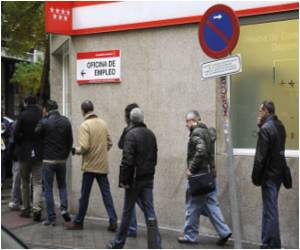In the mobile unit on the island of Lesbos, attending to thousands of refugees and migrants landing from neighboring Turkey is a round-the-clock affair.

Aching muscles, lower body injuries, pulmonary infections -- with around 350 patients a day, there is little time to dwell on specific patients.
"We treat the most glaring cases but when they reach their country of destination, these people will all need a full check-up," says MdM nurse Christos Doulgaris, saying the unit runs non-stop "like a factory".
"Until February, we mainly had young men but now, half are families that took the road when Europe became accessible," he said.
As health workers seek out diapers, infant formula and baby wipes, a mother tries to describe through an interpreter that her daughter is suffering from abdominal pain.
Her boys are also covered in insect bites.
Advertisement
Twenty-year-old Mahebulla from Afghanistan has come seeking help for his aching legs and feet.
Several health services on the island, including other volunteer groups, are active in helping the migrants.
"Eighty percent of arrivals are in good health -- they would need to be to get this far," adds Christoforos Theodorou, deputy director of Lesbos' main health centre.
"But maintaining hygiene (on the road) is difficult," he says.
MdM runs two separate units with patients sorted by country of origin.
Syrians are treated in the camp of Kara Tepe near the island capital of Mytilene, while other nationalities are directed to Moria, another camp further north of the port town.
- Funding cuts -
In Moria, there are just 12 toilets for 1,000 people. Poor nutrition is another contributing factor to ill-health.
For the past three weeks, the cash-strapped Greek state has provided no food for the migrants. Their only full meal comes from a local catering company, who is driving itself into the red in the process.
The migrants must pay out of their own pockets for the rest of the day, with mediocre sandwiches usually the only fare they can afford.
"The authorities owe us three million euros ($3.3 million)," says Christos Bazinas of the Elaitis company.
"We continue to provide 2,500 meals a day free of charge, but we can't do more," he says.
Funding cuts applied across the board since the Greek economic crisis began in 2010 have also hit the Lesbos health centre.
"The migrant influx has cost us around 700,000 euros since the beginning of the year," says the deputy director, noting that another 10-percent funding cut was applied this year.
- Premature discharge -
Eager to move on, many migrants discharge themselves prematurely, at risk to their health. In August, a woman from Somalia died from a pulmonary embolism after leaving hospital.
A month earlier, a man suffering from tuberculosis left without permission and had to be caught. Even the children often have no time to rest.
An eight-year-old Syrian girl in need of blood dialysis was redirected to an Athens hospital, but her parents never took her there. And another boy returned to the road with a barely-healed fractured leg.
"Most of them are focussed on their destination and their survival instinct overcomes their needs," says MdM psychologist Ana Panou.
Many of the migrants suffer from high stress, with the children particularly susceptible to depression and phobias, she adds.
On Friday, Greek authorities were placed on alert after an elderly Dutch tourist on the island of Kos -- another island with significant migrant arrivals -- displayed cholera-like symptoms.
Officials later said he was more likely suffering from acute gastroenteritis. But tests are ongoing, given what Sotiris Tsiodras, a senior pathologist at the centre for disease control and prevention (Keelpno), said was a suspected cholera outbreak in Iraq.
Source-AFP










